YouTube is a great resource for language-learning—you can learn new vocabulary, ways to use grammar structures, and hear different accents. If you’re just starting out your expedition into French YouTube, I’ve made a list of channels that can help you get started! These are more suitable for intermediate and advanced learners, as these videos only have auto-generated captions, and creators tend to speak quickly and use slang. (Sidenote – I found out the word in French is “youtubeur.euse” and I love it.)
Continue reading “YouTube en français”Practice your French and learn some science!

Sometimes the best way to practice a language is by just passively listening to it. This could be in a movie with subtitles, or just an interesting video on YouTube. I see it as letting your subconscious absorb the language through osmosis. Is that even a thing? Maybe there’s a science channel that talks about science-y stuff like that. Wait… there is!
C’est Pas Sorcier is a TV show available on YouTube that explains all kinds of science-related stuff in French. They’re meant for middle and high school students whose first language is French, so they do speak a little fast. I would recommend it for intermediate French speakers (A2 level). My personal favorite is “Comment fonctionne notre électroménager?”, it’s very interesting and the characters are really funny. This show is shown A LOT in French high schools, it’s very nostalgic and even though they’re still releasing new videos, they’ve kept their vintage essence. Go check it out!
Here’s the link to the channel! https://www.youtube.com/@Cestpassorcierofficiel
Film Recommendation: Зеркало (Mirror)
Andrei Tarkovsky is one of, if not the most famous Russian film director of all time. One of his most beloved films by Russian people, Зеркало (1975) is a semi-autobiographical sequence of clips playing with memory, war, and daily life in Moscow.
The film features stunning creative techniques, such as Tarkovsky’s famous long shots. The one above is considered not only one of his best shots, but one of the best in film history. Other techniques include color schemes and themes such as the mirror, time, and poetry, which is read by different characters and narrators throughout the film.
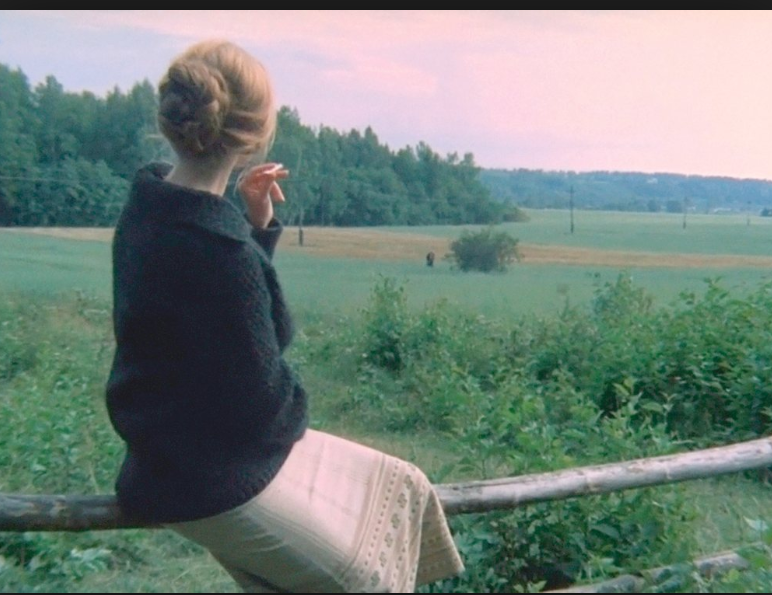
The plot is kind of tricky to explain. A dying poet is the narrator (something that isn’t revealed until the end), but the story is far from linear or clear. The scenes switch between different time periods, and it’s sometimes difficult to keep up with which one you’re actually in.
I’m no film buff, but this is definitely one of Tarkovsky’s most important works. He’s a hard director to understand no matter what, so you might as well start here! The Russian is fairly hard to understand, and I did need the help of subtitles to understand what was going on.
Try out a French-only dictionary!
Transitioning from English-French dictionaries to French-only dictionaries is a big step towards fluency but it can be intimidating. Luckily, online resources exist to help make French dictionaries more accessible.
For intermediate to advanced French learners seeking to take their vocabulary and understanding to the next level, The Centre national de ressources textuelles et lexicales (CNRTL) is an invaluable online resource. It is a searchable compendium of French language dictionaries, most notably Le Trésor de la langue française informatisé and the 9th edition of the official Dictionnaire de l’Académie française. For those interested in French outside l’Hexagone, CNRTL also has a searchable “Francophone” dictionary.
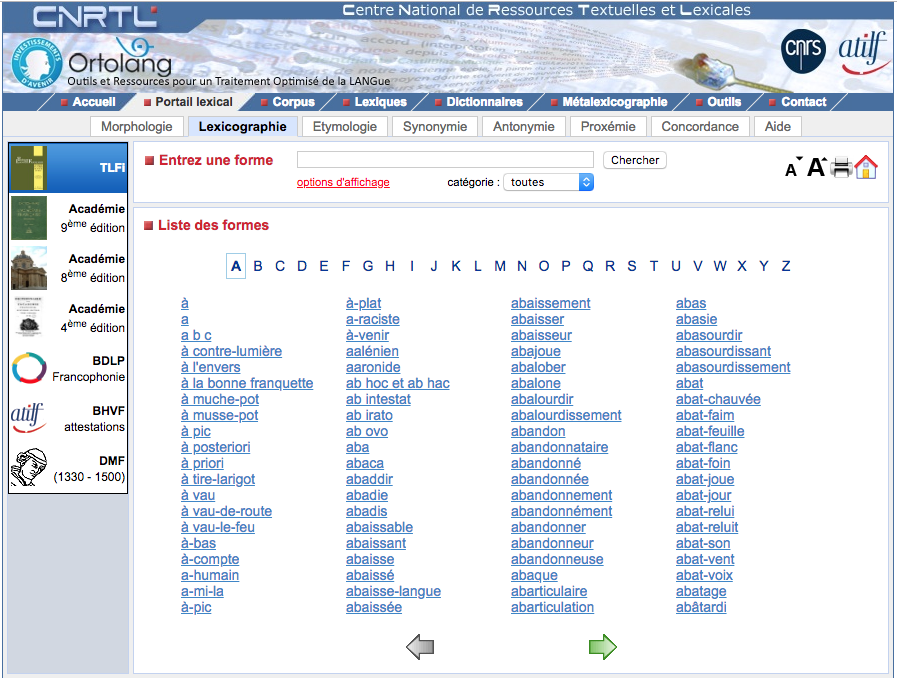
As a pedagogical tool, CNRTL, particularly when set to the TLFi (Le Trésor), does an excellent job of breaking definitions down into more digestible parts while also clearly differentiating between different uses of the words (metaphoric, literal, etc). Rather than struggling through an entire entry, the website quickly draws your attention to short portions of the text that are most essential.
By clicking “options d’affichage” you can toggle the color-coding settings to highlight what you’re looking for. The default settings use yellow for definitions, green for the word as it is used in a phrase, and orange to specify a certain technical domain or context in which the word may be used. Most un-colored text consists of examples of the word used in a sentence.
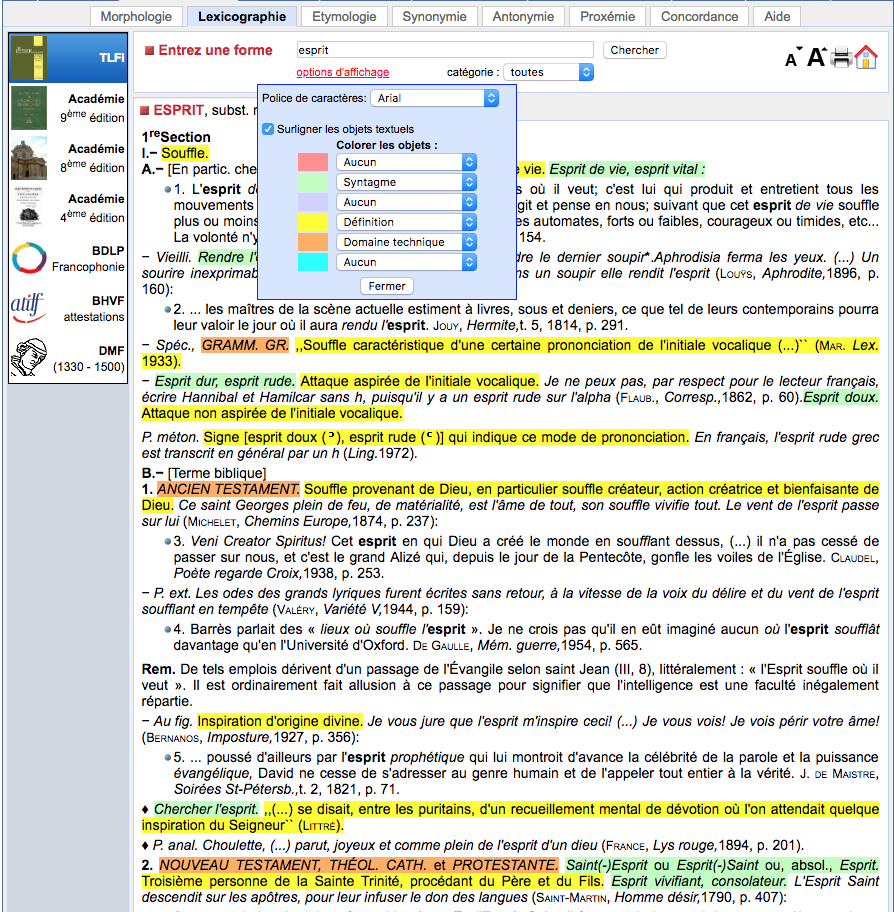
Beyond dictionaries, the portal also offers additional tabs such as etymology, synonyms, and antonyms, for those interested in the relations between words. The synonym tab is particularly useful when it comes to spicing up your writing (for example, when you’ve used “aussi” far too many times in one paper). It can also be helpful when it comes to making connections between the literal and metaphorical senses of words.
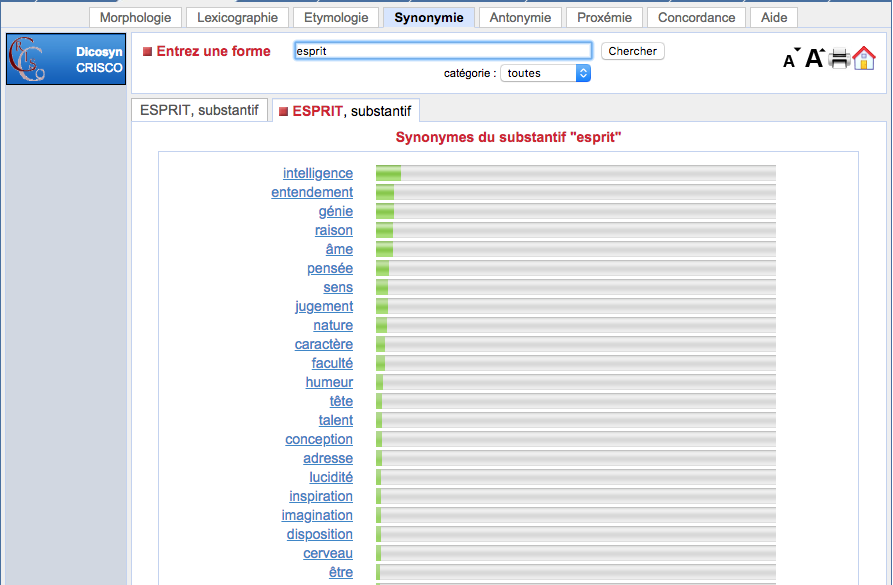
The website is full of other resources worth exploring, including several collections of works in French, and a database of “ghost” words lost to time.
You can access the dictionaries and pages pictured here at https://www.cnrtl.fr/definition/
Bonne exploration!
Elite! Your Next Netflix-Binge
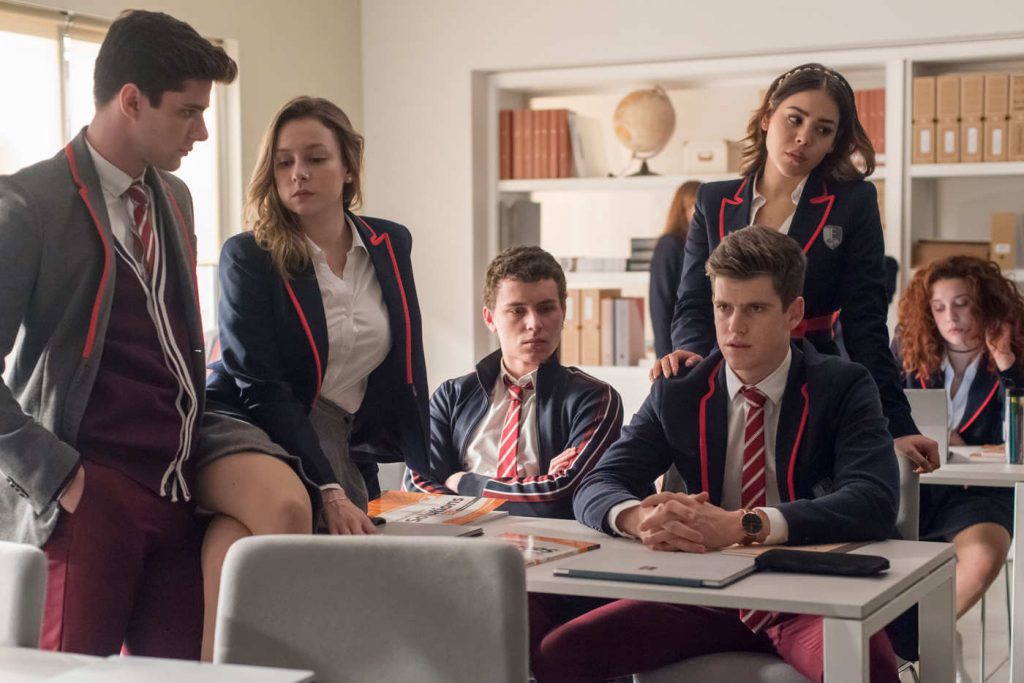
Looking for a new Spanish tv show filled with dramatic teenagers and a series of incredibly unlikely but intriguing events? Elite has you covered.
Netflix released season 1 of Elite in 2018, and although being a Spanish show, it gained popularity around the world. Elite follows 3 scholarship students from a working-class part of town as they begin attending Las Encinas, a rich private high school, for Spain’s most elite. This parallels flashforwards to the main character’s mysterious murder. Throughout the series, viewers are watching the events that led up to the killing along with police interrogations following the murder. This leads a viewer to constantly ponder who was killed, who was the killer, and what was their motive.
Elite has also been recognized for the diversity of its characters and storylines, taking on tough subjects especially for a dramatic teen tv show. There’s an inclusion of a gay storyline between two male characters, and their struggle to be accepted by one boy’s Muslim family. Additionally, one girl struggles with her religious identity when her school requires her not to wear a hijab to school. One main character even deals with the trials of being HIV-positive for the rest of their life.
Elite tries to cover a large variety of themes, from those mentioned above, to class and race struggles. The show has been criticized for often glossing over these themes in order to focus on flashy drama. However, in comparison to other shows of the same genre, it still introduces many issues relevant to young people of this time.
Elite does a good job of developing its characters as well. Many tropes are used at the beginning of the show, but it soon becomes clear that each character has a rich and interesting backstory explaining their actions as the show progresses.
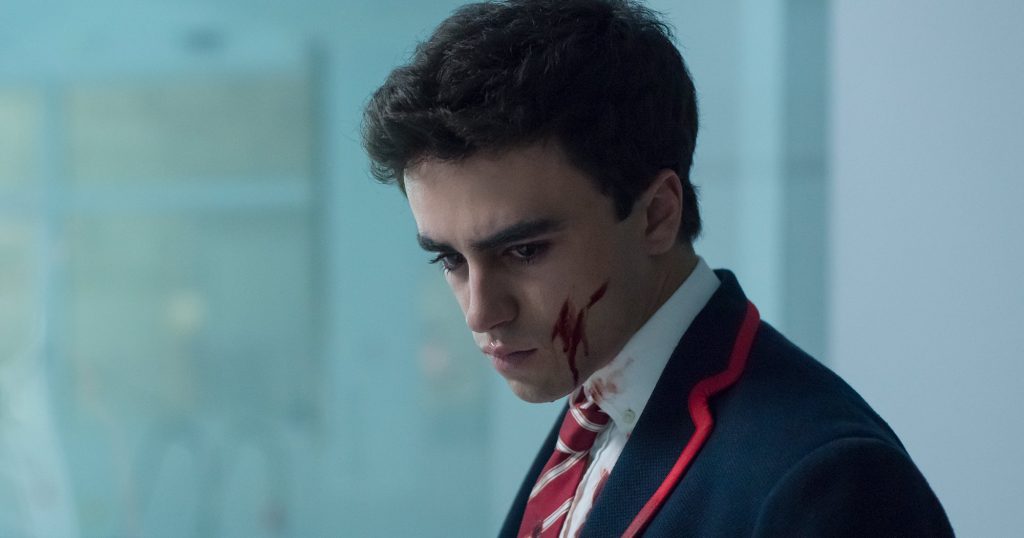
For Spanish-language learners, Elite offers great practice. The show is meant for native Spanish speakers and uses Spain-centric Spanish. Characters give beautiful dialogues, some slow and some fast. For any level of Spanish learner, Elite offers a learning opportunity. Beginners may opt to listen in Spanish but use English subtitles, intermediates may rely on Spanish subtitles, and expert speakers can face a challenge by watching the show completely subtitle-free.
Modern Russian Writers
We’re all familiar with, or at least have heard of, the classic novels of Dostoevsky and Tolstoy, but modern writers are sometimes left out when studying Russian. Here is a short introductory guide to some contemporary works you may want to check out!
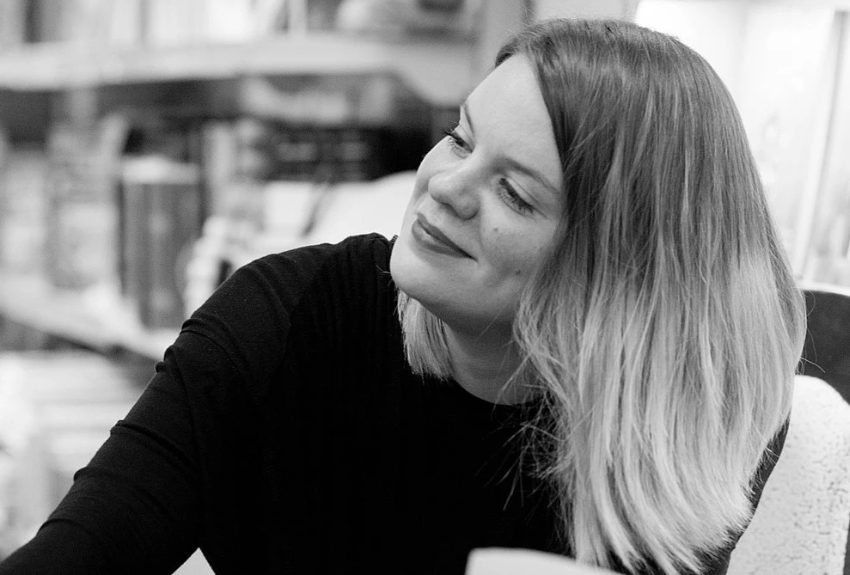
Vera Polozkova is a Moscow-based poet, who often puts her poems to music. She started writing by posting poems on her blog, and was later discovered and published by the writer Alexander Zhitinsky. Her poems cover many facets of daily life, and are often characterized as nontraditional and without a particular form. She believes that performance is a crucial part of poetry, and you can find many of her videos on YouTube. Her collection of poems “Nepoemanie” is also available in Russian on Amazon.
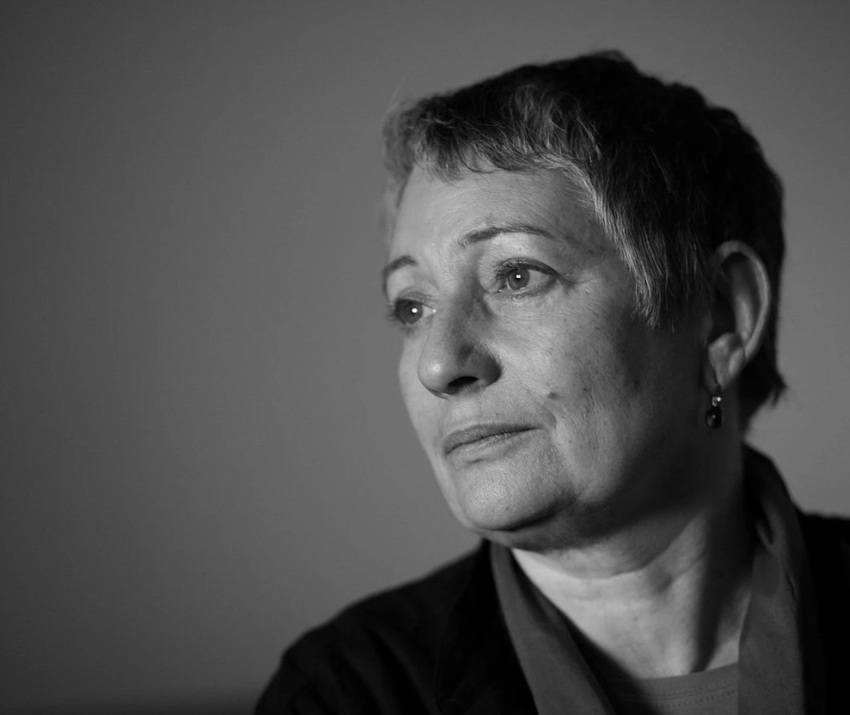
Dividing her time between Moscow and Israel, Lyudmila Ulitskaya writes novels mostly pertaining to religious tolerance and inclusion. As an ethnically Jewish woman who is religiously Christian, her writing deals with these struggles and others during the Soviet Union. Her books, including her newest titled The Green Tent, can be purchased on Amazon. She is also a well-known activist, most recently appearing as a speaker in an anti-war protest in Moscow.

With her relatives including Leo Tolstoy and Ivan Turgenev, Tatyana Tolstaya was born into a family of writers. Her works mostly take place during, towards the end of, or as speculation after the Soviet Union, and her writing style is thought to be characteristic of Leo Tolstoy and Anton Chekhov. Several of her novels are available at the Reed library, including her most famous, The Slynx, a dystopian novel about a forgotten post-Soviet Moscow.
Film Recommendation: Russian Ark
Russian Ark (2002) follows the 300-year history of St. Petersburg. Directed by Alexander Sokurov, this 96-minute film was completed in one shot, entirely taking place in the Winter Palace of the Hermitage Museum.
The narrator, a ghost of the city, follows an unnamed “European” through the museum, witnessing actors with beautiful costumes portraying historical figures such as Peter the Great, Tsar Nicolas II and his family, or Leningrad citizens during Soviet times. A lot of the Russian is quiet and muffled, so it may be hard for beginners to get everything. Either way, it’s still an interesting cinematographic piece!
This film is perfect if you want to learn something about past and presents notions of St. Petersburg and see a new use of cinematography. If you want to learn more about the making of the film, you can watch In One Breath (2003), a documentary that follows the making of Russian Ark.
Media Recommendation: German Music
Learning German and getting tired of Mozart, Rammstein and “99 Luftballoons”? Here are a few bands (covering a few different genres) that are a little newer.
AnnenMayKantereit – “Barfuß am Klavier”
A slow ballad, “Barefoot at the Piano” features some beautiful lyrics. As YouTube commenter Ryan King once said, “I’d never thought of German as a particularly beautiful language… that is until now.”
Cro – “Traum”
If you’ve been to Germany, you’ve probably heard this one. Cro, a German rapper/artist is known for his secrecy (he always wears a panda mask). This one’s a bit faster, but it’s catchy, and the lyrics aren’t too complicated.
Namika ft. Black M – “Je ne parle pas français.”
Most of this song is in German, with some French thrown in there when Black M raps. It’s slow, simple German, and repeats a lot. Find the lyrics here.
Olli Schulz – “Dann schlägt dein Herz” (Live) [Start at 2:33 for the song, or from the beginning to hear his introduction]
Olli Schulz, one of my personal favorites, is an indie-rocker with a great sense of humor. Here are the lyrics, and you can find the non-live version here.
Ready for a challenge? Then try:
Yung Hurn – “Ok cool”
Basically the Austrian equivalent of Trap. You’ll probably need the lyrics for this one.
Media Recommendation: “Кухня” (“Kitchen”)
Кухня is a Russian sitcom that came out in 2012, and consists of 6 seasons and 120 episodes. It follows the story of the main character, Maxim Lavrov, and his quest to become a chef in one of Moscow’s best restaurants “Claude Monet.” Maxim, along with the rest of the restaurant’s workers, are constantly finding themselves in humorous situations.
The conversation is fairly slow and simple, so the show is good for intermediate and advanced speakers to practice their listening. It’s also good for beginners, as a lot of kitchen and food vocabulary comes up.
The show can be found for free on YouTube. You can also purchase a subtitled version on Amazon, but I’d encourage you to save the money and practice your Russian.
Media Recommendation: Babylon Berlin (2017-)

Babylon Berlin (2017-) is a German crime series created by Tom Tykwer. The show is set in 1920s Berlin in the Weimar Republic, and deals with the intersecting criminal activities of that age.
Babylon Berlin is a must-watch for anyone interested in learning German. It is the most expensive non-American TV series ever made, and features beautiful cinematography. It’s also a good way to learn more about Berlin culture, since the series is very well-researched.

The first two seasons of the show are streamable on Netflix, and have good English and German subtitles. The language is fairly difficult to follow, mostly due to the Berlin accent that some of the characters use, but most of the story can be followed in context.
Check out the trailer here:
And check out this short interview in German with Liv Lisa Fries, who plays the principal female role, Charlotte Ritter:



